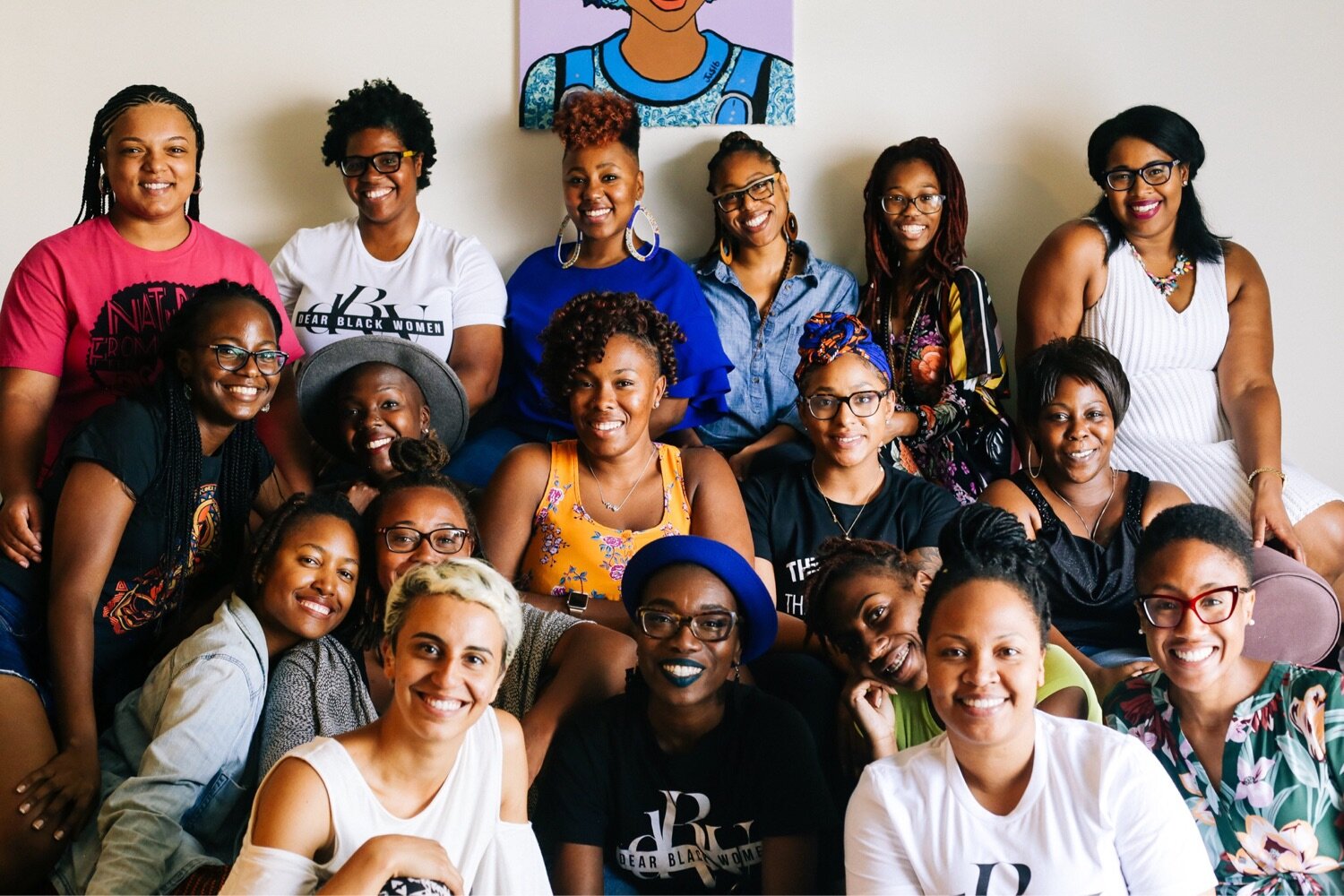
Dear Black Women.
Overview.
Partner Management | Project Management | Strategy | Team Management | UI Design | UX Design | UX Research
Dear Black Women (DBW) was an affirmation movement and support network where Black women convened to heal, connect, and share resources. Launched in Detroit, MI and expanding to New York City, DBW was a social impact venture that specialized in curating online and offline spaces that created community and increased the social capital of Black women. To achieve this, DBW adapted proven models of face to face support circles (used in anything from grief to recovery groups), community organizing and social networking that engaged over 15,000 Black women weekly across the country.
Role:
CEO/Founder | Everything & anything.
Location:
Detroit, MI
New York City, NY
Project Period:
Dec 2016 - Jan 2021
UX/Design Tools Used:
Adobe Photoshop | Canva | Google Analytics | Figma | Mailchimp | Pen & Pad | Squarespace | Sketch |
Credits:
Co-Circle Facilitation: Brandi Keeler | Co-Content Management: Christiana Allen-Pipkin | Co-Graphic Design: Julie Cruz, Samantha Grose | Photography: Dani B., Cydni Elledge, Ify Arinze, Kai Dowridge | Thought Partnership: Brandi, Christiana, Elena Simpkins, Elisabeth Michel, Ify, Julie Cruz, Kentaro Toyama | Web Development (for text platform): Alex Horak |
Problem.
Black women face singular challenges in all major facets of life. Systemic barriers and inequalities affect Black women deeply. For example, 80% Black mothers are breadwinners for their family. Yet, Black women’s median earnings lag behind almost all majors groups and quality childcare is unaffordable for many Black women. These realities place remarkable demands on our emotional, mental, spiritual bandwidth, often leading to feelings of isolation, compromised self-worth and well-being, as well as stymied self-actualization. As a result, many Black women struggle to find adequate affirmation, community and social supports, and, instead, piecemeal their needs across a variety of entities (i.e. sororities, online outlets and religious groups) with limited success.
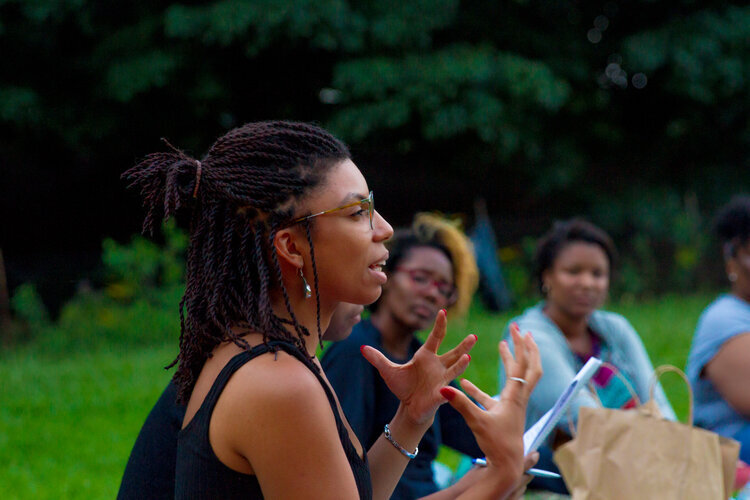

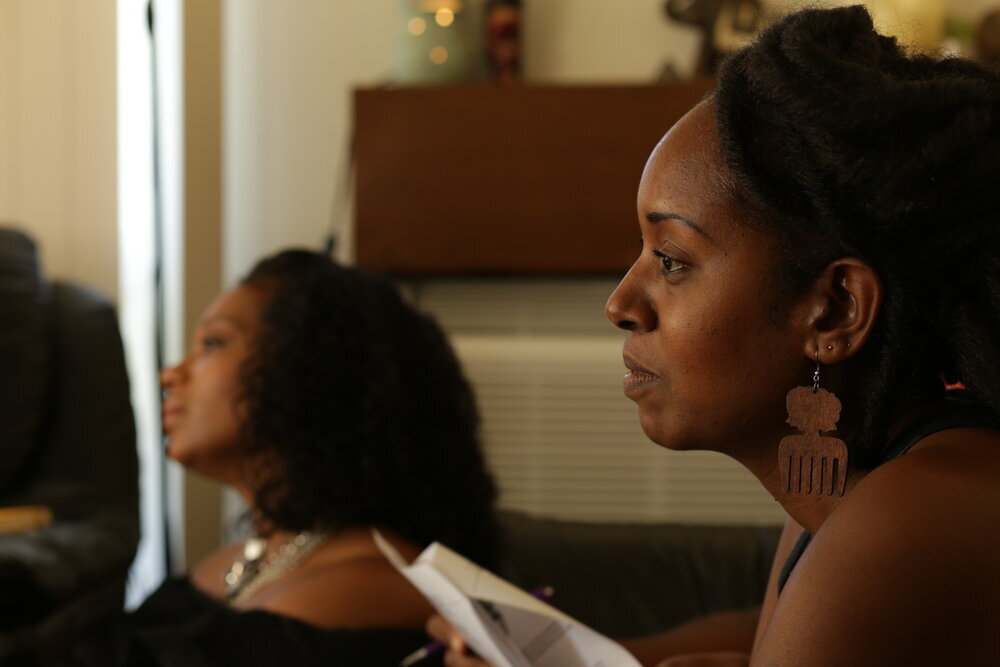

Inside Dear Black Women Affirmation events.
Theory of Change.
Research demonstrates that the right kind of social and personal supports can help alleviate feelings of stress Black women experience. This literature emphasizes the importance of mutual, bilateral support with members of a trusted community. Even small interventions can have an effect. For example, verbal self-affirmations, either repeated to oneself or written down regularly have been shown to boost self-efficacy and esteem.
Dear Black Women aimed to offer Black women such supports through an evidence-backed and culturally relevant slate of online and offline offerings.
By skillfully creating affirming online and offline spaces, Dear Black Women developed a support network that increased our member’s social capital, expanded their bandwidth, and provided access to community, knowledge and resources.
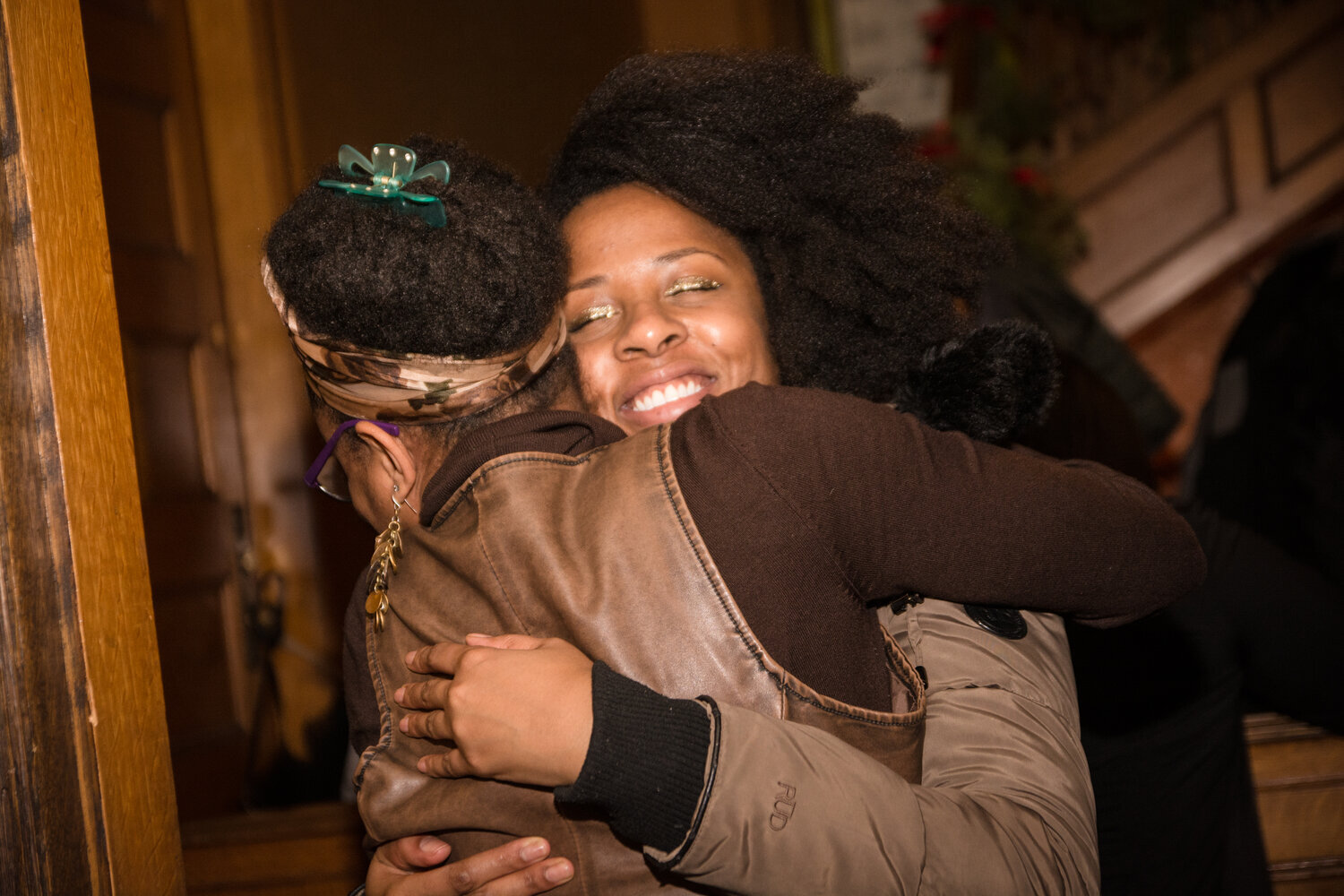

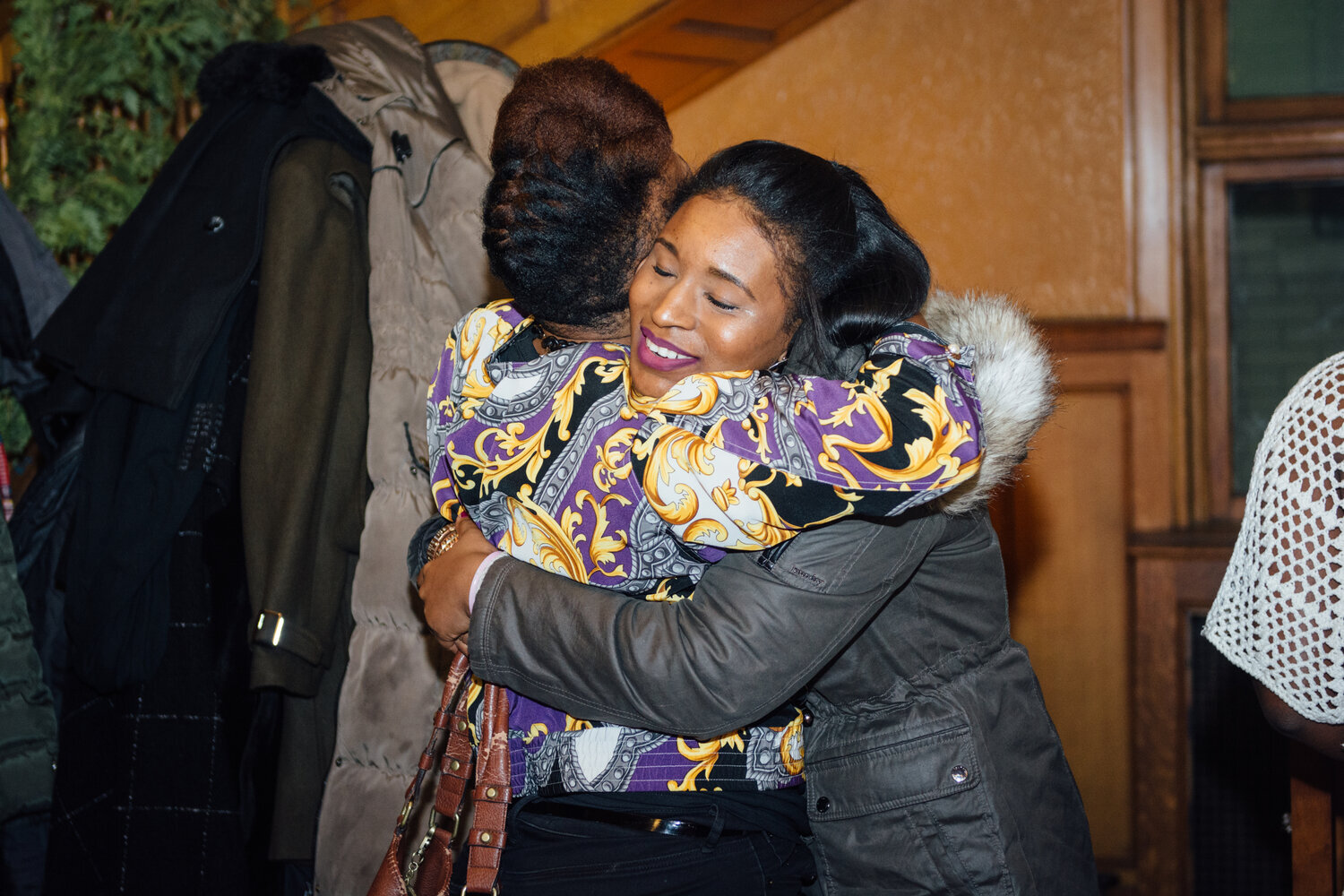

Inside Dear Black Women Affirmation events.
Solution.
Dear Black Women had 50 Affirmation events — Affirmation Circles and Parties — across 2 DBW hubs: Detroit and New York City metro areas. Affirmation Circles and Parties featured unique event models that promoted community building, resource sharing, and social supports.
Complementing these offline events were Dear Black Women’s online offerings including: daily affirmation texts, newsletters and Instagram.
Both online and offline efforts combined to reach over 15,000 Black women weekly and served as channels for resource sharing (example: mental health resources), community building and social supports.
Within its hubs, DBW partnered with 40 Black women owned businesses, connecting them to the Dear Black Women network, which generated over $50,000 in partner revenue.
Dear Black Women is…
Dear Black Women is an affirmation movement and support network for Black women by Black women.
DBWs are Black women of all backgrounds who are working to love themselves and share that love with other Black women. Be her religious, spiritual, agnostic, atheist, cis, trans, LGBTQIA, not working or working, 18 yo or 150 yo, in or not in school, documented or undocumented, penny pinching or balling, single or partnered, differently able or able bodied, etc!
Process.
Research.
Market Research & Strategy.
Of the ~15 million Black adult women in the United States, Dear Black Women’s primary audience was Black millennial women (born 1981 - 1996), representing a total addressable market of 6 million. This population is highly concentrated in urban areas (80%). 98% have broadband connection or a smartphone, one of the highest rates for any millennial group, and over-index for time spent on social media.
Dear Black Women’s strategy was to target Black millennial women currently or recently in universities and colleges, a market of ~4,000,000. The logic was to:
Tap into early adopters within college networks who could utilize their online presence and their institutions’ existing social infrastructures as natural recruitment channels.
Skillfully engage these early adopters, providing them with experiences, materials and incentives to expand DBW’s reach to Black millennial women who have never attended college, as well as other generations of Black women.
User Interviews.
I was fortunate to conduct a total of 100 interviews, reaching approximately 300 Black women:
50 one-on-one interviews.
50 group interviews; average group size of 5.
Age Breakdown:
70% - Millennial.
25% - Generation X.
5% - Baby Boomers.
20 - 60 minute interviews.
Competitive Analysis.
The user research process revealed that in at least 90% of interviews, Black women stated that they struggled to find adequate affirmation, community and support.
Instead, they piecemealed their need for affirmation, community and support from a variety of entities. These entities typically fall within four major categories for Black millennial women:
Exclusively focused: Entities open to a limited segment of Black women by design, as they implement selection processes or require specific affiliations for participation in their activities (i.e. Black sororities, religious groups, etc.).
Activities focused: Entities exclusively organized around specific types of activities (i.e. exercise, hair, etc.).
Regionally focused: Entities that limit the scope of their impact to specific geographic areas.
Online focused: Entities that engage with Black women exclusively online, excluding offline connections critical to delivering maximum value to Black women in need of social supports.






Inside Dear Black Women Affirmation events.
Affinity Diagram.
Creating affinity diagrams, I discovered the following themes came up in at least 90% of the interviews, even when controlling for age, socioeconomic status, educational attainment, geography and family structure:
Feeling “overextended”, “drained” and/or “under-valued” in a key area of life (home, work, etc.)
Feeling “under-represented”, “unseen” and/or “misunderstood” in a key area of life (home, work, etc.)
Inadequate “safe spaces” and supports.
A specific desire for more enriching and affirming Black women spaces.
Organizing Insights.
There were multiple affinity diagram sessions to process the influx of insights from user interviews. Here’s one.
Personas.
Pulling from the affinity diagrams, I was able to further synthesize user insights into personas. This activity allowed me to better empathize with users as I pivoted to designing solutions.

Ideate & Design.
Offline: Dear Black Women Affirmation Circle & Parties.
Dear Black Women had multiple formal and informal in-person events, but the two primary event types were: the Affirmation Circle & Affirmation Party.
Circle | The Affirmation Circle was a transformational community gathering that centered affirmations attendees were guided to write. To co-create a safe and affirming community space, all attendees adhered to DBW’s 5 agreements. I developed the facilitation model by:
Adapting best practices from face to face support groups, such as grief and recovery groups;
Leveraging my previous facilitation experience;
Refining techniques, in partnership with Brandi Keeler, based on cultural relevance, user input and Circle experiences.
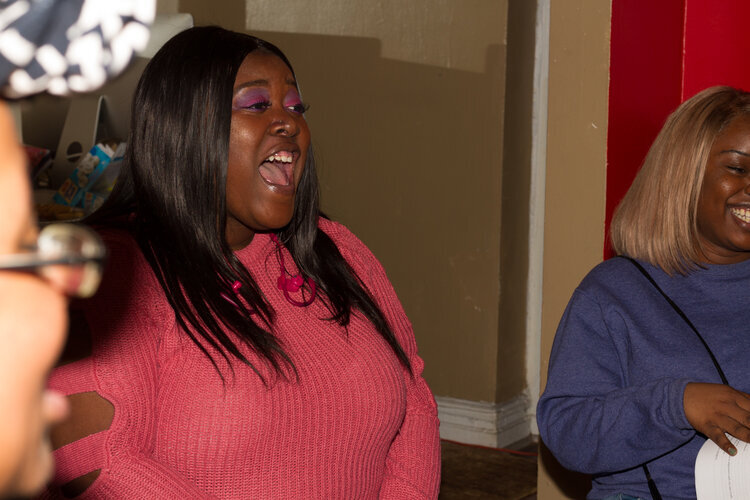
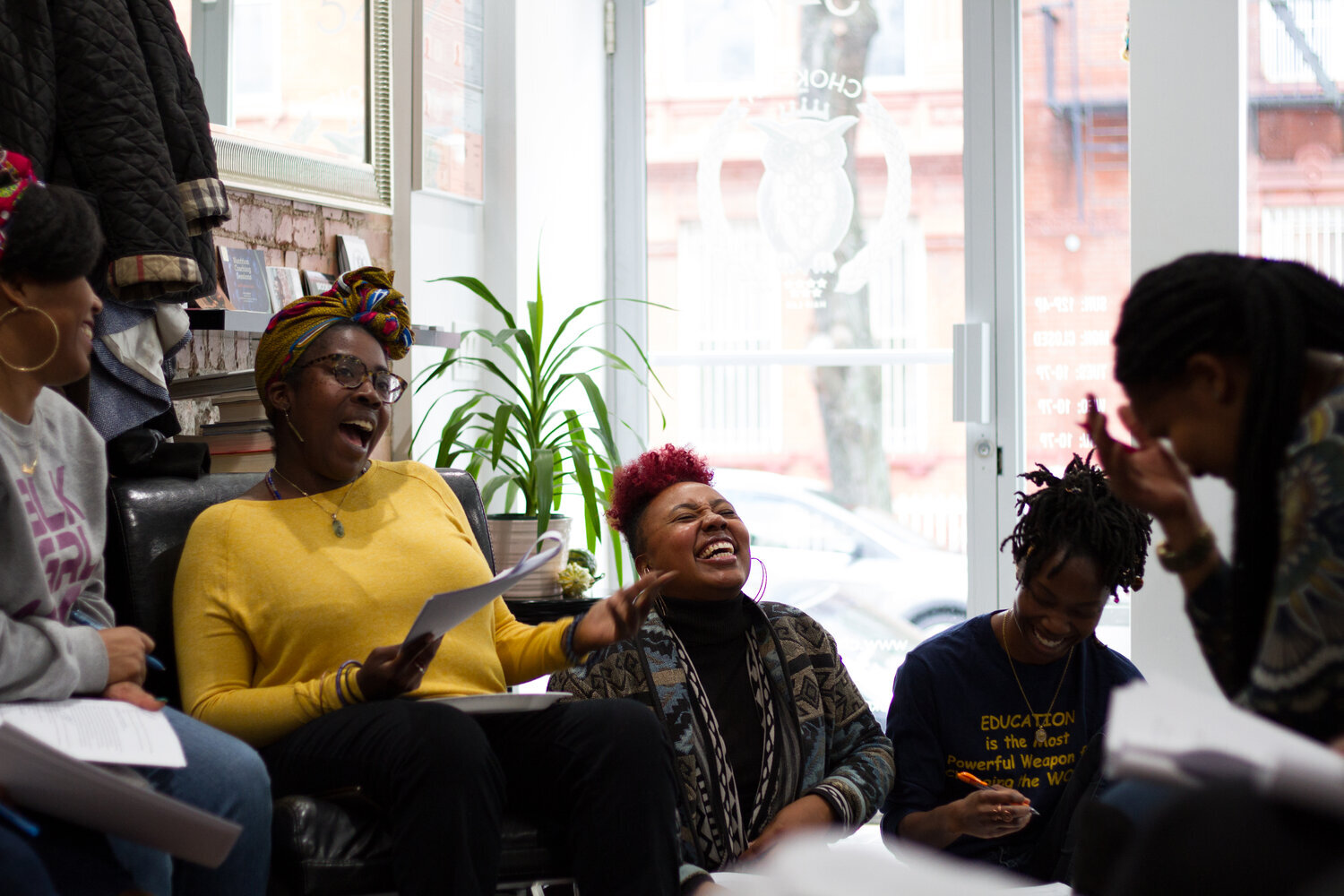
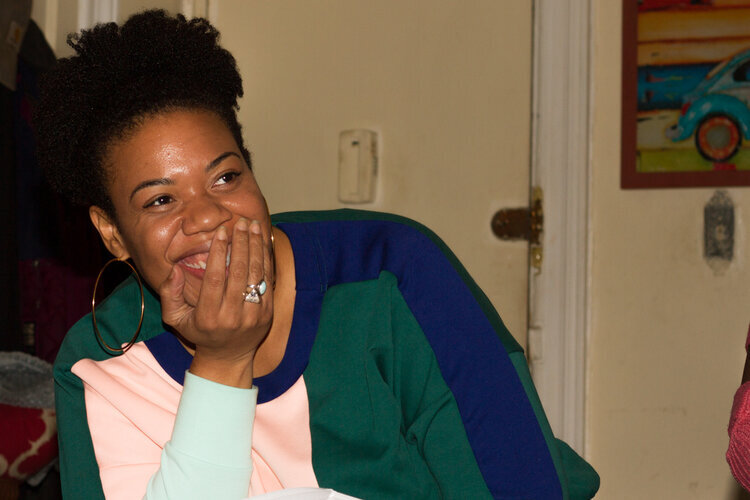

Inside Dear Black Women Affirmation events.
Party | The next primary event type was the Affirmation Party. Many Black women experience some form of unwanted attention or, even worse, sexual harassment at parties. Thus, DBW parties were a much needed departure from that experience, offering affirming and celebratory safe spaces, in which Black women could have fun without concern or judgement.
Additionally, Affirmation Parties showcased Black women owned businesses that were partners of Dear Black Women. Think: party meets local marketplace.
These offline events helped address the needs of Dear Black women seeking in-person connections, resources and community supports.

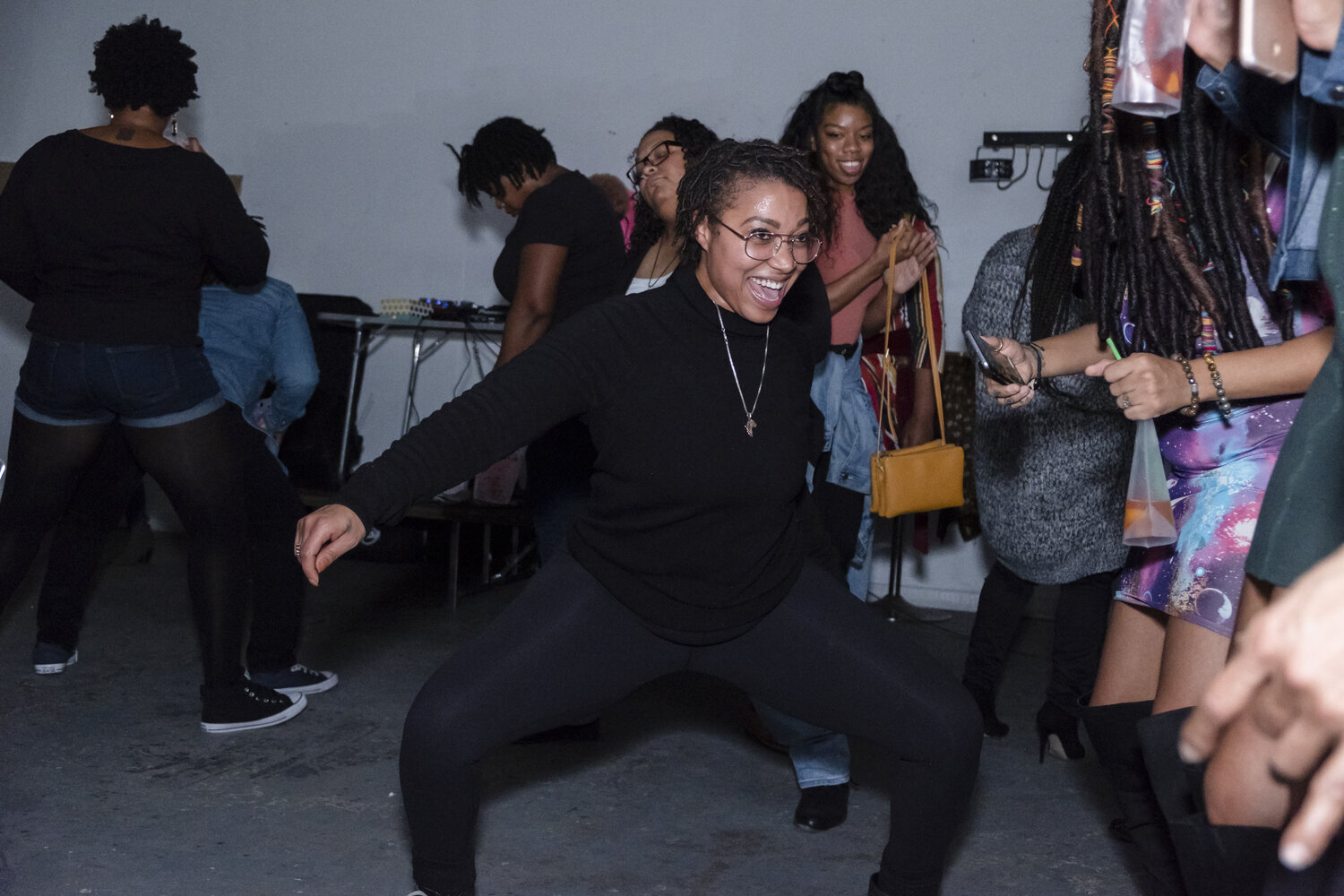
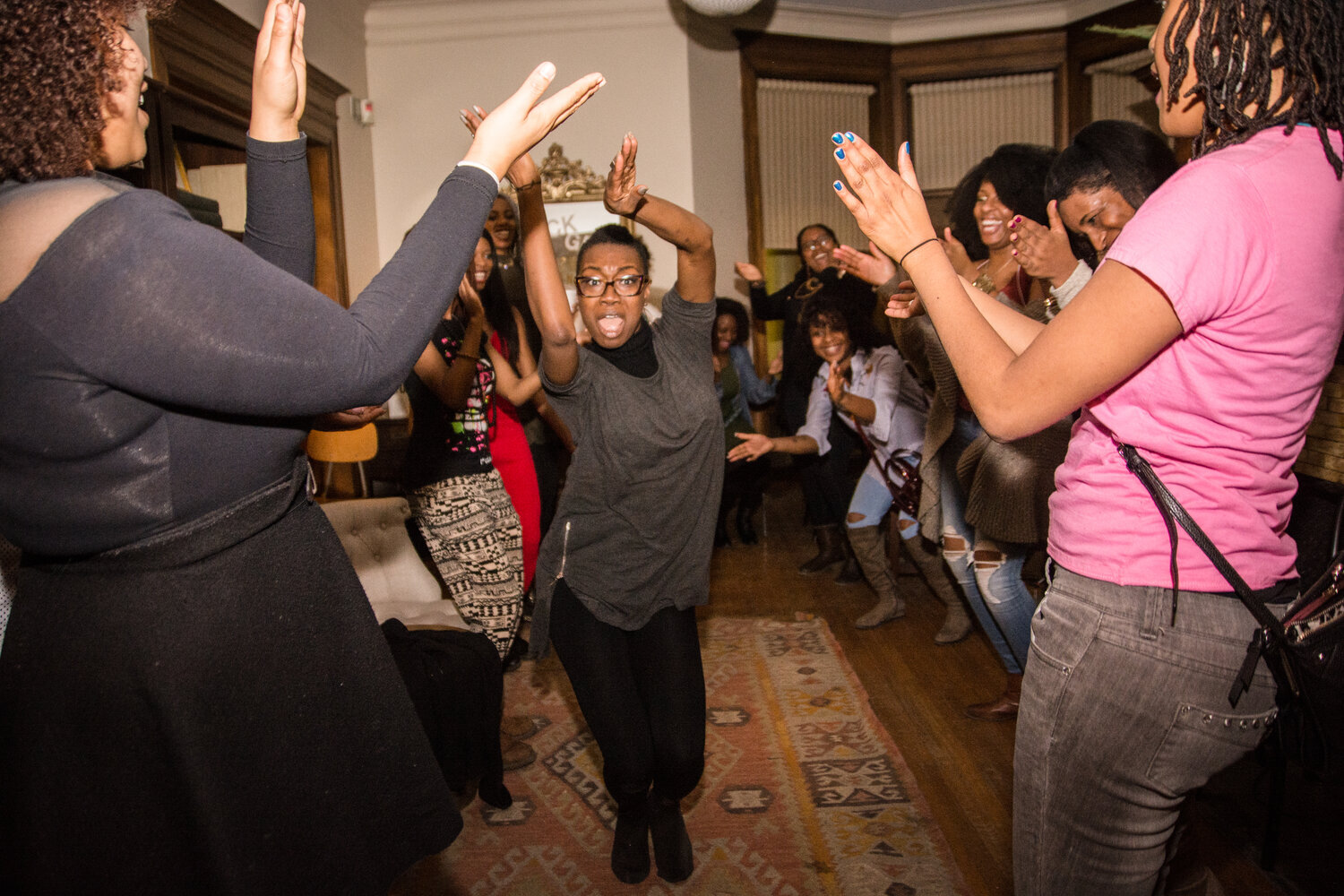
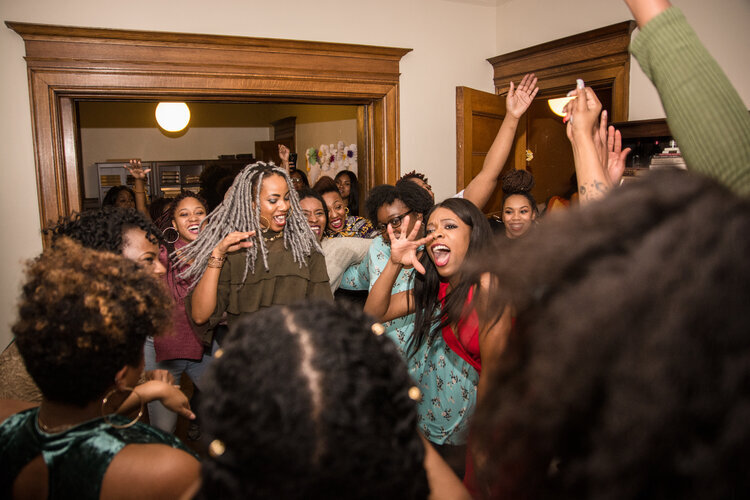
Inside Dear Black Women Affirmation events.
Online: Dear Black Women Affirmation Texts, Newsletter & Social Media.
Dear Black women’s primary market of Black millennial women are part of the digital vanguard of highly connected, technology trailblazers. Thus, a critical component of Dear Black Women’s value proposition was our online engagement.
I designed, managed and curated Dear Black Women’s:
Daily affirmation texts.
Affirmation newsletter (see limited archives here).
Instagram channel.
Each of these online channels featured user generated content by Dear Black Women members, relevant resources (for example), historical facts, and opportunities to connect in offline events in Dear Black Women’s hubs.
These online channels helped address the needs of Dear Black women seeking affirming resources and community that they could access when their schedules permitted.
Brainstorming.
With so many components of Dear Black Women, it was critical to have dedicated brainstorming sessions. I led many of these sessions with the Dear Black Women “Dream Team”, a diverse and evolving group of DBWs who served as thought partners and mini-focus group members.
Brainstorms typically followed these protocols:
Some of the DBW “Dream Team” pose at the end of a brainstorm.
Do:
Capture Everything
Encourage Participation
Ask Clarifying Questions
Don’t:
Evaluate Anything
Force Participation
Ask Judging Questions
Next Steps:
Categorize
Reduce
Analyze
Honoring the voices of Dear Black Women.
DBW received 1,000’s of pieces of user generated content (UGC) via our online and offline channels. UGC included pictures, affirmation letters, poems and quotes from Black women across the globe. The brainstorming session below focused on how to best manage the UGC and leverage its transformative power across DBW’s online and offline channels.
What we work on and how we work on it.
The persistent opportunity (and challenge) in my work with Dear Black Women was how to remain resourced and well while ensuring all the needs of our growing movement were met. The brainstorming session below explored how to execute organizational goals while also centering personal wellness and community care.
Branding.
Dear Black Women’s visual design had to express the spirit of the organization: warm, forward-thinking, approachable, expressive, fiery, inspirational, bold, confident, women-driven, and so much more.
To achieve this, I partnered with Revamp Designs to create DBW’s Style Guide.
Sketches & Wireframes.
Whether designing the DBW website and newsletter, or developing content for our social media channels, I used sketching and wireframing to bring the brand to life. My design goal was always to create an immersive and personal visual experience that reflected and affirmed DBWs across the country.
I wanted Dear Black Women everywhere to see themselves — their faces, their words — celebrated.
Sketching Dear Black Women’s Instagram Feed.
Evaluate & Iterate.
User Feedback & Data Analysis.
User data played a critical role in Dear Black Women’s development. I gathered feedback through:
Post event survey.
Anonymous post event surveys for every event.
Special Circle Workshops where new techniques were tested with focus groups.
Quarterly surveys for texts subscribers.
I also regularly analyzed engagement on DBW’s website (via Google Analytics) and social media channels, tailoring content to the most compelling topics.
User Informed Improvements.
User data led to many iterations across DBW’s offerings. Below are some examples of how it impacted the Dear Black Women Affirmation Circles.
To increase access to more attendees:
Circles evolved from all day retreat style events to 3 hour events.
Circles dates were adjusted to weekends mid-day. This worked with the weekly rhythms of most Circle attendees, who were juggling work, family, school, and more.
To facilitate a safe space, Circle attendees had a 30 minute grace period after the start time to arrive. No exceptions.
DBW Circle agreements and facilitation techniques were consistently refined to meet attendee needs.
Results.
Offline: Dear Black Women Affirmation Circle & Parties.
Snapshot:
Expanded offline events to 2 metro areas: Detroit and New York City.
50 Affirmation Circles and Parties.
1,000 attendees with a 70% retention rate (attendees who attended 2 events or more)
95% average rating on all events.
What Dear Black Women Say About DBW…
“A DBW Circle is something every Black women needs in her life. It was a safe place full of healing. A place full of acceptance and love, laughter and life.”
A Dear Black Woman
“DBW Circles are a space for Black women to shed the expectations of society and armor, be ourselves, be vulnerable, and connect with other Black women from all walks of life.”
A Dear Black Woman

Online: Dear Black Women Affirmation Texts, Newsletter & Social Media.
Snapshot:
3,000 daily affirmation text subscribers.
5,000 newsletter readers.
12,500 Instagram followers.
15,000+ weekly reach across all online and offline platforms.
What Dear Black Women Say About DBW…
“DBW has been a balm in a very harsh world. What you built, Flo, changed lives. May you reap 100 fold what you have sown into the lives of countless Black women! I, personally, have been transformed by DBW, and I know I'm not the only one. We love you!”
A Dear Black Woman
Fundraising, Partnerships & Press.
Snapshot:
Won 10 grants and awards, including the Michigan Business Challenge and Entrepreneur of the Year.
Secured $120,000 in capital through fundraising and sales.
Partnered with 40 Black women owned businesses.
Connected partners with customers, generating $50,000 in partner revenue.


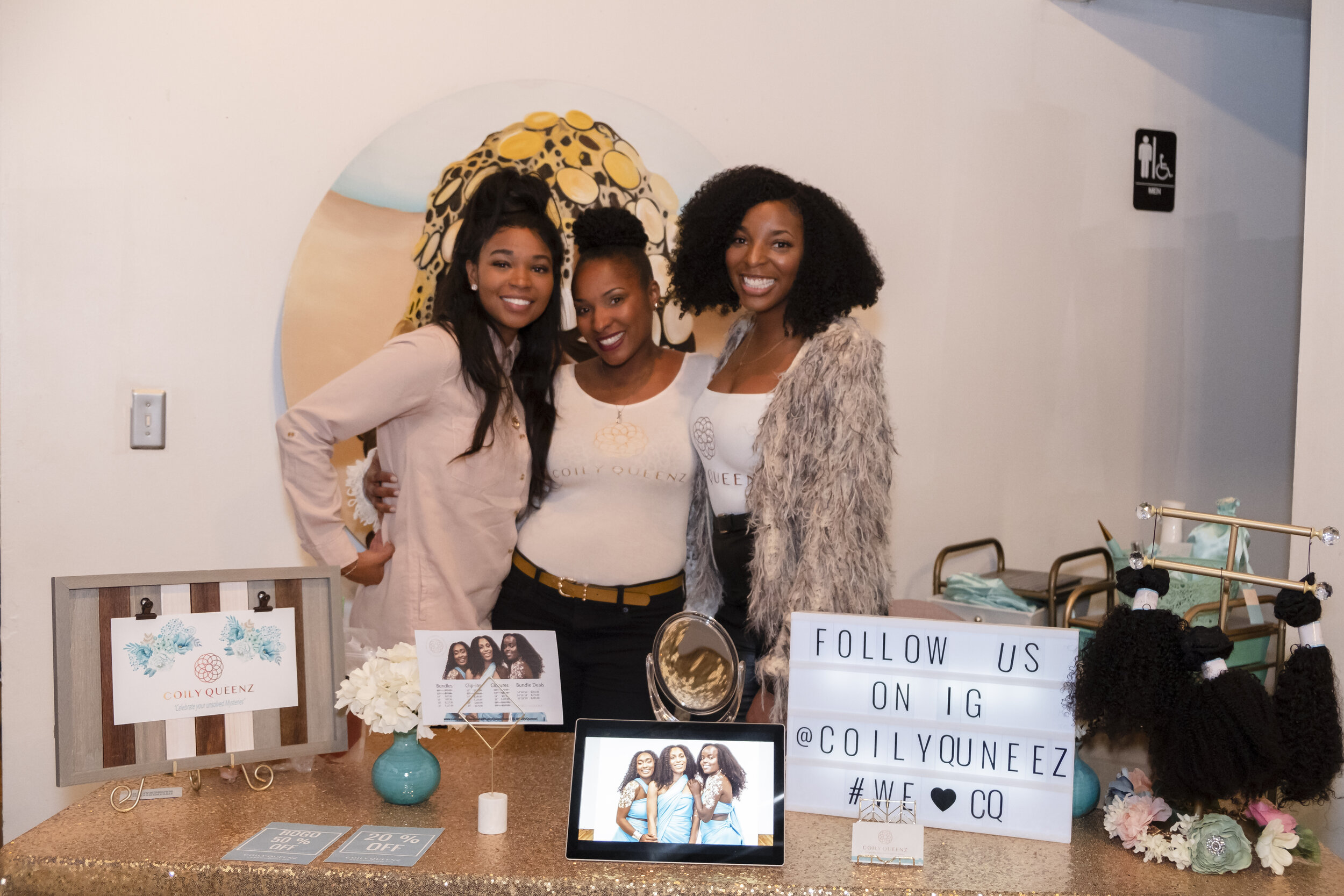

Dear Black Women partners.
Reflections & Lessons.
Mobilizing Is Not Organizing. Organizing > Mobilizing.
How You Do Work Is As Important As What Work You Do.
Introduce Price And Philosophy on Exchange Early On.



























